Connecticut Data Privacy Act (CTDPA) – A Complete Overview
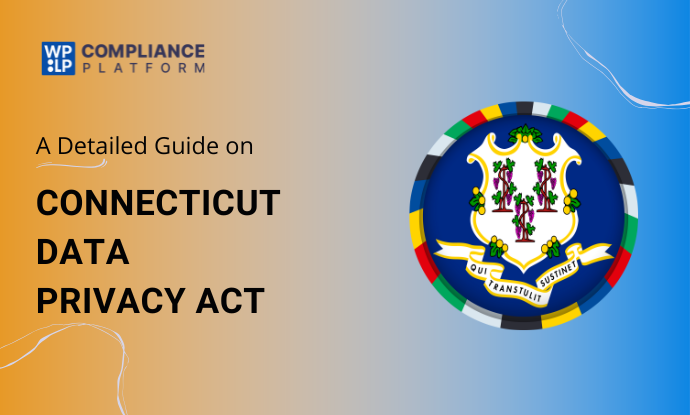
Summary
Businesses must update privacy policies, honor consumer rights, and implement secure data practices. Non-compliance may result in penalties under state law. Tools like WP Legal Pages and WP Cookie Consent simplify CTDPA compliance for WordPress websites.
Did you know that people also refer to the Connecticut Personal Data Privacy Act (CTDPA) as the Connecticut Personal Data Privacy and Online Monitoring Act?
Connecticut’s data privacy law is the fifth to be enacted in the US and the most recent aimed at strengthening consumer privacy online.
Like the laws in California, Colorado, Virginia, and Utah, the Connecticut Personal Data Privacy Act (CTDPA) aims to protect consumer privacy and give individuals greater control over their online data.
Though Governor Ned Lamont signed the bill into law on May 10, 2022, the new Connecticut Data Privacy Law did not take effect until July 1, 2023. This grace period provided time for companies to create and implement a data privacy plan to comply with the Connecticut Data Privacy Act.
Let’s examine Connecticut’s new law in more detail, discussing its purpose, scope, requirements, and the actual steps your business can take to comply.
What is the Connecticut Data Privacy Act (CTDPA)
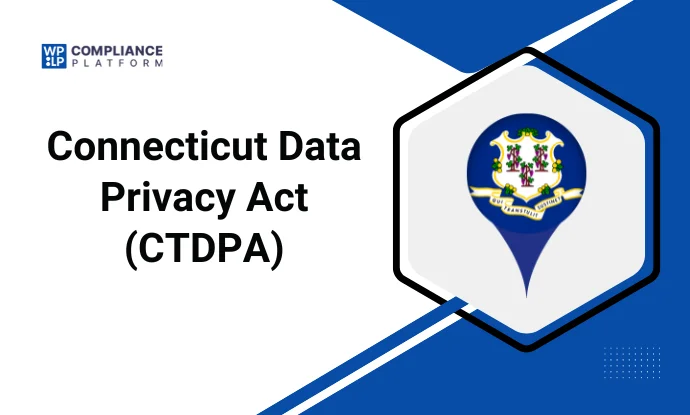
The Connecticut Personal Data Privacy Act (CTDPA) was signed into law to protect the personal data and online privacy of Connecticut residents.
The CTDPA is intended to protect Connecticut residents’ online privacy from the abuse of personal data.
It passed through the Connecticut General Assembly on April 28 and was signed into law by Connecticut Governor Ned Lamont on May 10, 2022.
Joining the growing list of states, including California, Virginia, Colorado, and Utah, the CTDPA:
- Grants new rights to citizens of Connecticut
- Imposes various duties on businesses that fall under its scope
- Specifies exemptions for some organizations and data types, and
- Delegates enforcement authority to the Attorney General
To achieve this, the law introduces several privacy rights to give consumers greater control over the collection and use of personal data.
Connecticut’s new law also places a series of obligations and privacy protection standards on any company doing business in Connecticut or marketing to its residents.
CTDPA borrows several features from other state privacy laws, especially Virginia’s VCDPA and Colorado’s CPA.
Who Must Comply With the Connecticut Data Privacy Act?
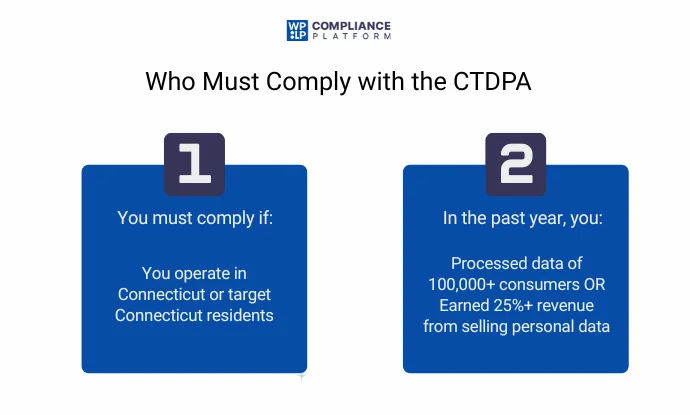
Organizations that qualify as controllers or processors have to comply with the Connecticut Data Privacy Act.
You must comply with the CTDPA if your business meets both of these criteria:
- You do business in Connecticut or sell services or products to the residents of Connecticut.
- In the last calendar year, your business handled or processed 100,000 or more consumers’ personal data, or if your business received more than 25% of its overall revenue from selling personal data. It does not, however, encompass “personal data controlled or processed solely for the purpose of making a payment transaction.”
What are the Consumer Rights Under the CTDPA Law
Like other privacy laws, Connecticut’s new law grants its citizens various rights over how businesses collect and use their personal information.
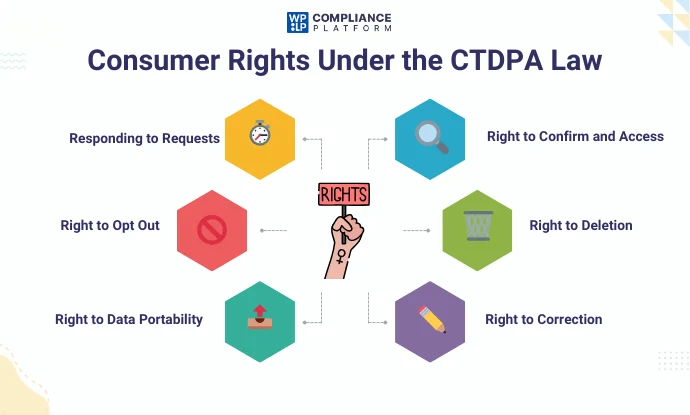
These rights are as follows:
- Right to Access – Consumers can confirm whether their data is being processed.
- Right to Correction – Users can correct inaccuracies in their personal information.
- Right to Deletion – Consumers may request the deletion of their data from your systems.
- Right to Data Portability – Users can receive their data in a portable format.
- Right to Opt Out – Users can opt out of data processing for targeted ads and sales.
- Responding to Consumer Requests: As a controller, you are required to respond to a consumer’s request within 45 days of receiving the request.
How Businesses Can Comply With Connecticut Data Privacy Regulations
The Connecticut Data Privacy Act (CTDPA) requires businesses to take specific steps to ensure transparency, data security, and respect for consumer rights.
If your business processes the personal data of 100,000 or more Connecticut residents, you must meet the following compliance obligations.
Key Compliance Steps:
- Update Privacy Notices: Clearly disclose your data collection, sharing, and usage practices in an accessible privacy policy.
- Honor Consumer Rights: Provide mechanisms for users to access, correct, delete, and opt out of the sale or targeted advertising of their data.
- Implement Data Protection Practices: Conduct regular data protection assessments and limit data collection to what is necessary and relevant.
- Obtain Consent: Ensure opt-in consent for processing sensitive data such as race, religion, health, or precise geolocation.
- Provide Secure Opt-Out Methods: Enable users to opt out through universal opt-out mechanisms starting July 1, 2025.
Meeting the requirements of Connecticut’s Data Privacy Act (CTDPA) can be complex, especially for small to mid-sized businesses that don’t have in-house legal teams.
However, compliance doesn’t have to mean costly consultants or hours spent drafting legal content from scratch.
That’s where the WP Legal Pages Compliance Platform comes in. This is one powerful platform where you get complete legal & cookie protection under one platform.
The WPLP platform features two powerful plugins: WP Legal Pages and WP Cookie Consent, which help you create legal documents and manage cookie consent effectively.
WP Legal Pages: Your Privacy Policy Generator
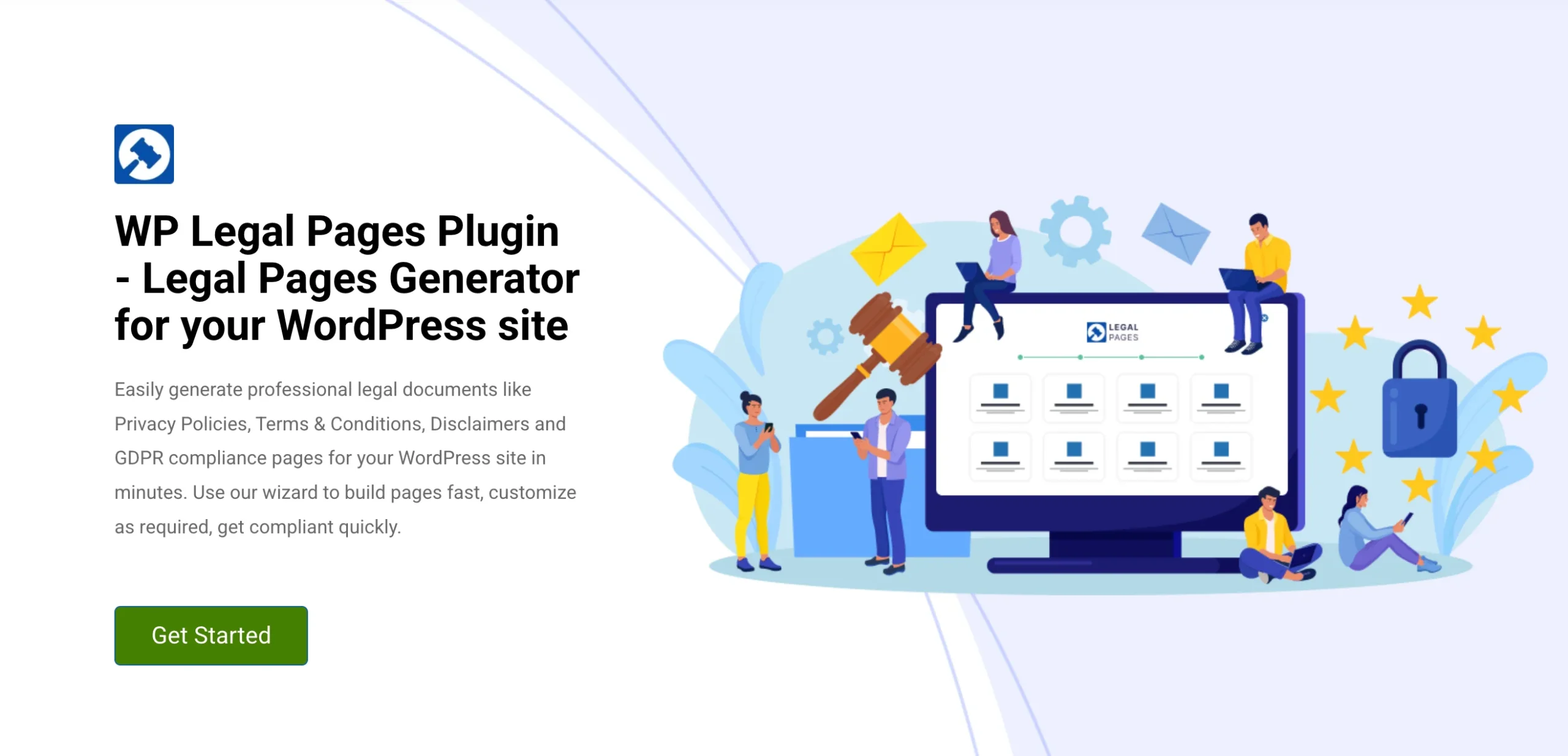
WP Legal Pages is a compliance-focused plugin that enables you to create and publish essential legal documents, such as privacy policies, cookie policies, disclaimers, and many more in just a few clicks.
Generating a privacy policy that complies with CTDPA using WP Legal Pages is easy.
The plugin asks easy-to-answer questions regarding your business and data processing operations. Then, it generates a compliant policy based on your responses, which can be uploaded to your website in just seconds.
See what it looks like below.
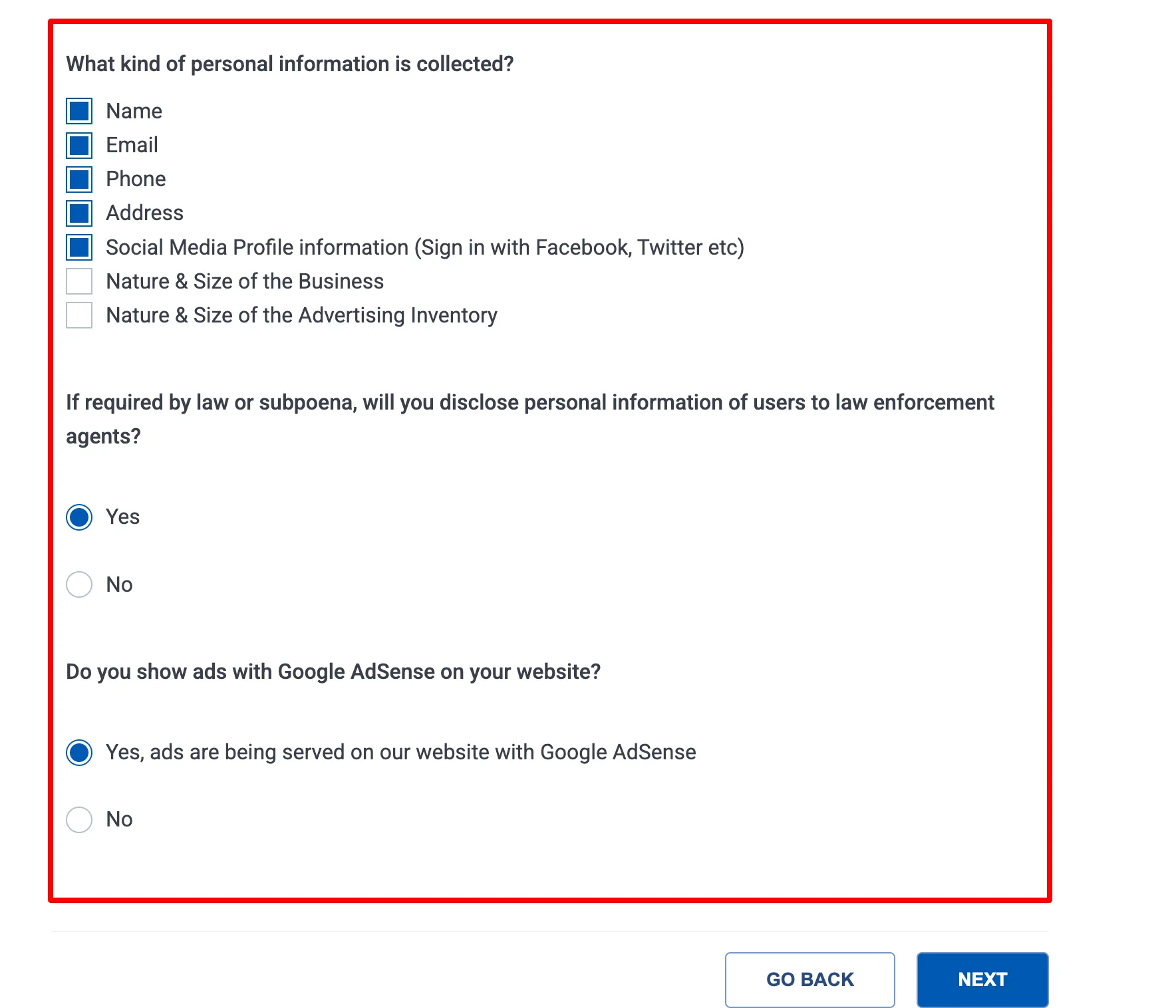
WP Cookie Consent: Advanced Consent Management Platform

Connecticut law emphasizes the importance of user consent, particularly when dealing with sensitive data or targeted advertising.
WP Cookie Consent helps you fulfill this requirement by offering both Opt-In and Opt-Out Models. It aligns your site with the CTDPA’s requirements, such as opt-out options for data sales or targeted advertising, and opt-in consent for processing sensitive data.
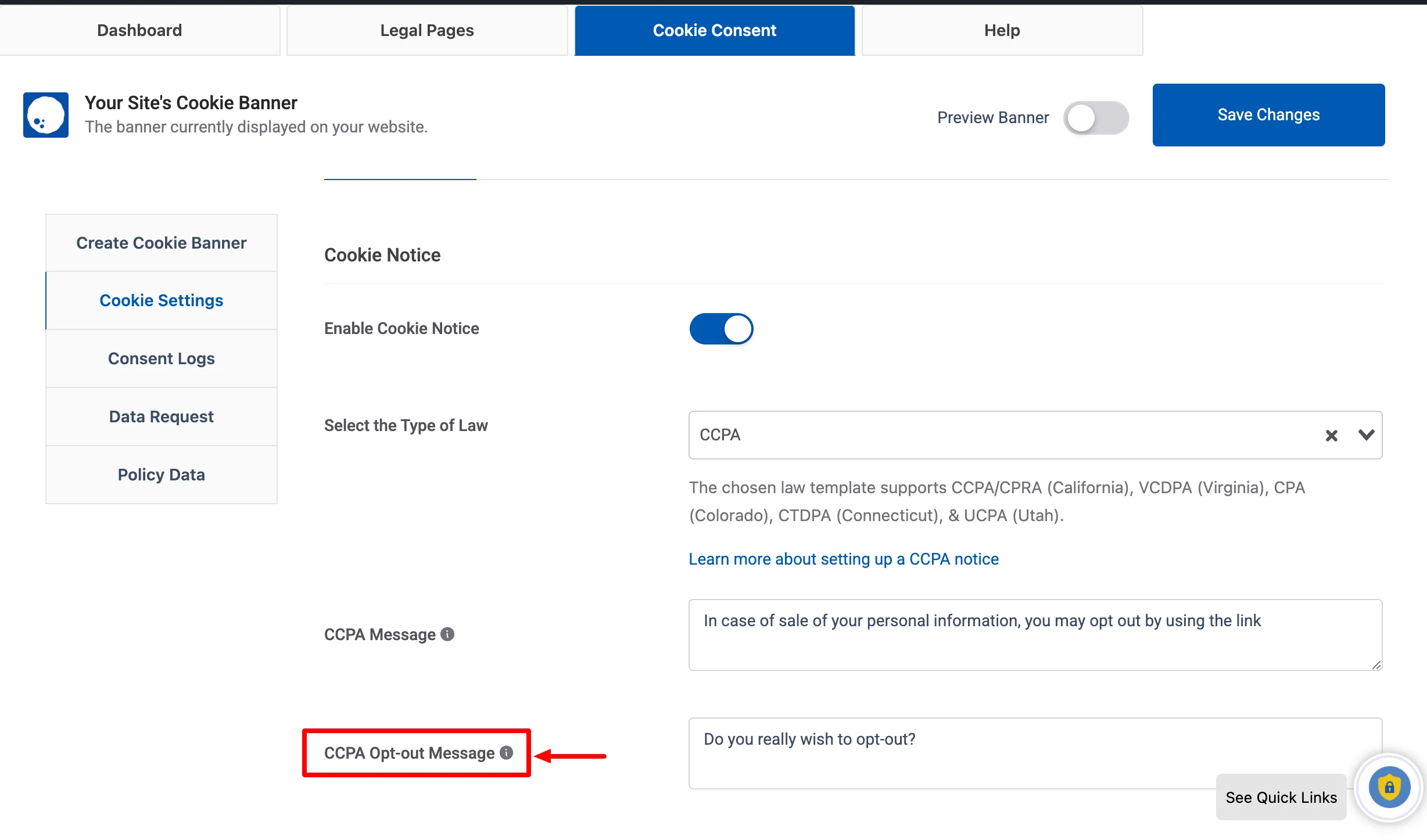
Additionally, the plugin supports a Data Subject Access Request (DSAR) form, enabling users to easily request access, correction, or deletion of their personal information, as mandated under Connecticut’s privacy law.
WP Legal Pages and WP Cookie Consent offer a comprehensive and scalable solution for businesses operating WordPress websites that want to stay compliant with Connecticut’s privacy law.
Connecticut Privacy Act Penalties and Fines for Non-Compliance

While CTDPA does not outline specific fines, violations are treated as unfair trade practices under the Connecticut Unfair Trade Practices Act.
If the breach is not corrected within 60 days, the AG can bring an enforcement action.
The potential sanctions the attorney general may seek to impose are:
- Up to $5,000 per willful violation
- Equitable relief, such as restitution, disgorgement, and injunctive relief
A business must be found liable in an enforcement action in court for the attorney general to penalize it under the CTDPA.
FAQ
The Connecticut Data Privacy Act is a privacy law that gives Connecticut residents more control over their personal data.
CTDPA Law applies to any business that targets personal data of at least 100,000 consumers or derives more than 25 percent of its gross revenue from selling personal data.
Non-compliance with the Connecticut Privacy Law can result in penalties up to $5,000 for each intentional violation.
Businesses can comply with the CTDPA law by implementing a compliant consent mechanism and maintaining a compliant privacy policy.
Conclusion
The Connecticut Data Privacy Act is the latest addition to the consumer privacy laws enacted in the US. As more states pass legislation to safeguard consumers, companies that process or control consumer information must review their privacy practices.
While all the state laws are similar, they are not identical. Companies subject to CTDPA law should take specific measures to meet the requirements of the Connecticut Data Privacy Act’s strict regulations.
You should update your privacy policy to ensure it aligns with all applicable legal provisions.
Additionally, you must provide consumers with several ways to exercise their data privacy rights, including a cookie banner linked to a consent preference center and a Data Subject Access Request (DSAR) easily accessible on your website.
We suggest using the WP Legal Pages Compliance Platform to simplify compliance with the Connecticut Data Privacy Act.
If you like this article, you might also like reading:
- Nebraska Data Privacy Act: A Complete Guide to Compliance
- Utah Consumer Privacy Act (UCPA) – Compliance Guide
- New Hampshire Data Privacy Act (NHPA) – A Compliance Guide
Streamline compliance with legislation, such as the CTDPA, and more using the WP Legal Pages Compliance Platform.
